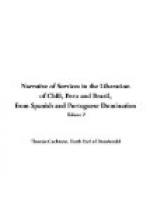“The religion of our forefathers suffered an equal persecution in its ministers and its temples; these were deprived of their riches, not for the service of our country, but for the reward of espionage, and to deceive us with useless trickeries. The satellites of this bandit were equally despotic with himself, and committed under his protection the most horrid crimes. This is not a proper place in which to insert the baseness with which he abused the delicacy and weakness of females. Fathers of families * * * *. Every man was intimidated. Every feeling man wept, because all were the victims of the caprice of this insolent upstart, who made an ostentation of atheism and ferocity.”
“It is impossible to recapitulate his actions. Volumes would be necessary to shew the world the arbitrary crimes of this atrocious individual. It would appear that for the commission of so many offences he must have had some cause that impelled him, for they could not possibly be the effect of ignorance. It was impossible to believe that by insulting and ruining every one, plundering our property, despising the ingenuity and talents of the Peruvians, and endeavouring to introduce anarchy, he could be longer tolerated in this capital. Was the reduction of Peru to the most degrading slavery, the means to make us or even himself happy?” &c. &c. &c
The reader can—from what has been narrated in these pages,—form pretty correct opinions upon the majority of the enormities which drove Monteagudo into exile. Of his private character I have always foreborn to speak, as considering it a thing apart from official acts—but as the Limenos themselves have forcibly alluded to it, I can say that in no respect can their allegations be called in question.
The opinion of the roused Limenos, that for Monteagudo’s plunders, insults, and cruelties, there “must have been an impelling cause,” is correct, though it is rather surprising that they should not have more justly estimated that cause. The vast amount of silver and gold which I spared in the Sacramento at Ancon, as being the property of the Protector, shews the gulf which swallowed up his plunder of the inhabitants. The costly extravagance of the Government—amidst which the degraded Minister’s ostentation was even more conspicuous than that of the Protector himself—could have had no other source but plunder, for of legitimate revenue there was scarcely enough to carry on the expenses of the Government—certainly none for luxurious ostentation; which, nevertheless, emulated that of the Roman Empire in its worst period—but without the “panem et circenses.”




